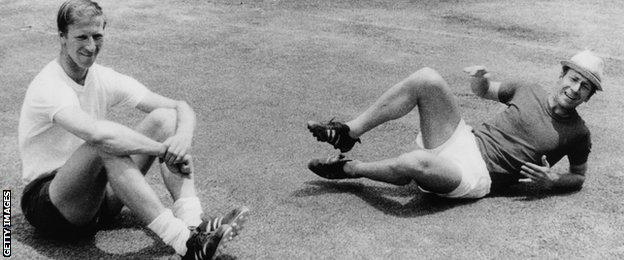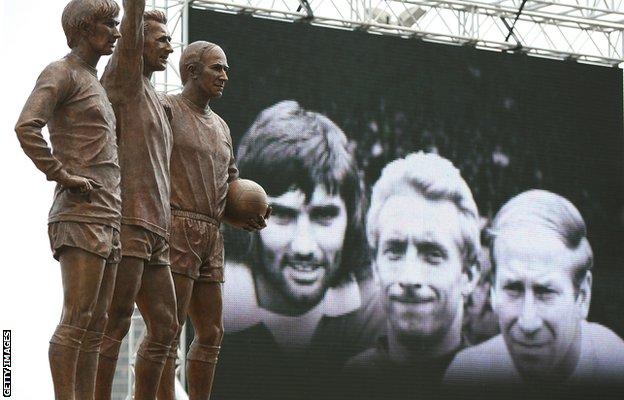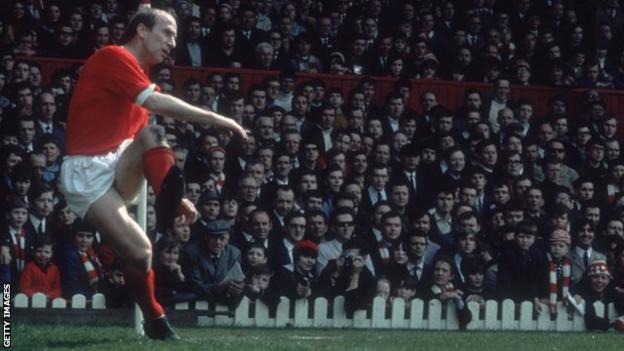Sir Bobby Charlton: A Manchester United icon and one of sport’s greatest figures
Sir Bobby Charlton #SirBobbyCharlton

Sir Bobby Charlton, who has died aged 86, was arguably the finest English footballer of his generation and one of the most famous and enduring sportsmen the country has produced.
Born in Ashington, Sir Bobby played alongside elder brother Jack against West Germany at Wembley in 1966 as one of only 11 England players to win the World Cup and captained Manchester United to the game’s major honours, including the European Cup in 1968.
The European Cup win, with Sir Bobby scoring twice in a 4-1 win against Benfica at Wembley, carried great poignancy and emotion because he was a survivor of the Munich air disaster on 6 February 1958 which killed 23 people, including eight players and three members of the club’s staff.
United, led by manager Sir Matt Busby, were pacesetters in the pursuit of the iconic trophy and had just successfully come through a quarter-final against Red Star Belgrade. They were making their way back to Manchester when tragedy struck.
This made the win over Benfica, with United becoming the first English club to win the European Cup, the conclusion of a journey laced with tragedy then triumph. Sir Bobby, only 20 at the time of the crash, said a day never passed without him thinking of those who were lost.
It is the central part of a story and a life that led to Sir Bobby becoming an iconic figure not only in his own country but around the world. His brilliant talents, especially the trademark explosive shooting, made him a global figure and latterly one of sport’s most respected elder statesmen.
Sir Bobby was almost destined for sporting greatness given he was born into a footballing family. Brother Jack reached the top with Leeds United and England – and four uncles were players, including Newcastle United legend Jackie Milburn. Sir Bobby’s mother, Cissie, was a football fanatic only too happy to encourage her sons.
 Jack and his brother Sir Bobby Charlton pictured on England duty at the 1970 World Cup in Brazil
Jack and his brother Sir Bobby Charlton pictured on England duty at the 1970 World Cup in Brazil
He signed for United as a schoolboy in 1953 and turned professional in October 1954.
The great Busby Babes were in their formative years, as they demonstrated by winning the FA Youth Cup three seasons in succession in 1954, 1955 and 1956.
He was a key element as Sir Matt, who almost died at Munich, rebuilt the club and they went on to have years of success.
Sir Bobby’s promise also ensured he won England honours early in his career, making his debut against Scotland at Hampden Park, a little more than two months after Munich. It was the first of 106 caps.
He made his United bow against Charlton Athletic at Old Trafford on 6 October 1956, scoring twice in a 4-2 win before going on to score 249 goals in 758 appearances. They won the title in 1956-57 but were denied the Double, Sir Bobby playing in the 2-1 defeat by Aston Villa in the FA Cup final, during which goalkeeper Ray Wood suffered an early injury.
The trophies kept coming throughout the 1960s as Sir Bobby was joined by those two other members of the legendary Old Trafford triumvirate, striker Denis Law signing from Torino and then the brilliant young George Best emerging from the youth ranks.
Sir Bobby was an FA Cup winner in 1963 when United beat Leicester City 3-1 and league titles were on the way in 1964-65 and 1966-67 as Sir Matt’s side fought alongside so many other top-class teams for domestic supremacy.
 United’s holy trinity: Statue of George Best, Denis Law and Sir Bobby Charlton outside Old Trafford
United’s holy trinity: Statue of George Best, Denis Law and Sir Bobby Charlton outside Old Trafford
And the man who was alongside the great Scottish manager all the way was the on-field architect; Sir Bobby’s mastery from midfield, the variety in his play and ability to deliver match-defining moments marking him out as true world-class for United and England.
The personal accolades were plentiful as he was named Footballer of the Year in 1966, when he also won the coveted Ballon d’Or, before finishing second behind Hungarian Florian Albert and United team-mate Best in the subsequent two years.
And 1966, was of course, the pinnacle of his England career when the World Cup was won, Sir Bobby being described as “the lynchpin” by manager Sir Alf Ramsey.
Sir Bobby played in the 1962 World Cup in Chile when England were knocked out in the quarter-final by eventual winners Brazil. He excelled but then topped that with his stellar performances four years later.
He scored the famous Wembley blockbuster with his right foot from 25 yards in the 2-0 win against Mexico in the group stage, then scored the two goals that beat Portugal in the semi-final, their side adorned by Eusebio, who he would meet again two years later in the European Cup final when he was Benfica’s shining star.
The 1966 final win still remains the greatest moment in the history of England’s football team, the Charlton brothers both slumping to the turf in tears following the 4-2 win over West Germany after extra time.
Sir Bobby continued to perform magnificently for United and England, although the win over Benfica effectively marked the end of Sir Matt’s great team as they went into decline around the time the manager declared his intention to retire.
Munich air crash changed my life – Sir Bobby Charlton
Sir Alf Ramsey counted on Sir Bobby in the heat and altitude of Mexico in 1970 when England defended the World Cup, the final fateful moments of his glittering international career still a point of debate today.
England had been 2-0 up in the quarter-final against West Germany in Leon but after Franz Beckenbauer pulled one back, the manager replaced Sir Bobby with the younger – and outstanding – Colin Bell from Manchester City. It was suggested Sir Alf was conserving the 32-year-old for the semi-final while also protecting the veteran from the effects of searing heat.
Sir Bobby’s removal acted like a release on the West Germans and a drain on England, who were beaten 3-2 after extra time. He never played for England again, ending with a then record 49 goals.
He was to experience no more success as a player during a tumultuous time at United, a club that had lost direction, leaving at the end of the 1972-73 season. For his final game, Sir Bobby received a prolonged standing ovation and a presentation of a silver cigarette box from Chelsea chairman Brian Mears before kick-off at Stamford Bridge, the game ending in a 1-0 loss as United just escaped relegation, a fate that would befall them the following season.
It seemed inevitable that Sir Bobby would go into management and so it proved. He took over at Preston North End but he appeared ill at ease with the ruthless cut and thrust of the role, suffering relegation in his first season in 1973-74.
 Sir Bobby Charlton taking a corner for Manchester United in 1968 – the year when he was awarded an eight-year contract
Sir Bobby Charlton taking a corner for Manchester United in 1968 – the year when he was awarded an eight-year contract
He returned as a player in the following campaign but it was an unhappy time and he resigned in August 1975 after Preston’s board sanctioned the sale of defender and captain John Bird to Newcastle United without Sir Bobby’s blessing. Apart from a brief spell as Wigan Athletic caretaker manager in 1983, his career in front-line football was over.
Sir Bobby, understandably, was in huge demand as a pundit, working for the BBC for many years. He was also back at his beloved Manchester United as a director in June 1984 and was knighted a decade later, having been awarded the OBE in 1969 and the CBE in 1974.
As a director, Sir Bobby was the perfect bridge over United’s past, present and future, providing wise counsel to a succession of managers, including Sir Alex Ferguson as United’s glory years returned under the legendary Scot.
Brother Jack presented him with the BBC Sports Personality of the Year lifetime achievement award in December 2008. He was awarded the Freedom of Manchester in 2009 and Old Trafford’s South Stand was renamed in his honour in February 2016.
Sir Bobby was a familiar figure at United game’s in the presence of his wife Lady Norma until he was diagnosed with dementia, his presence a constant reminder of his status as of one sport’s greatest figures.